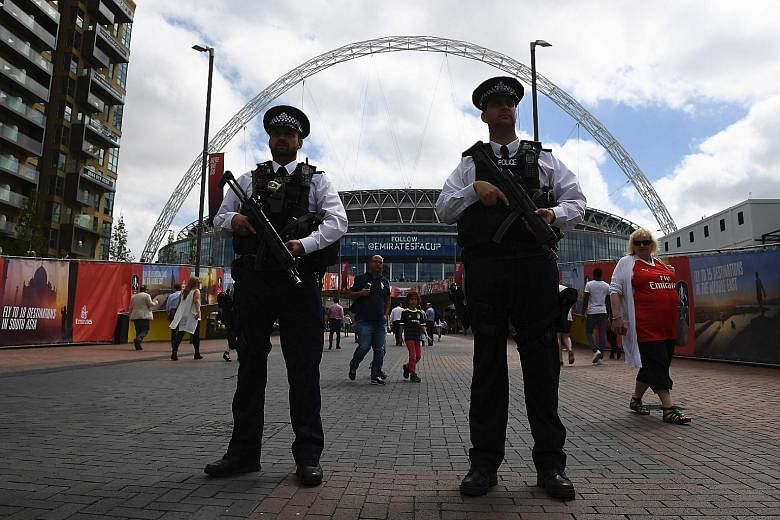Britain reduced its terror alert from the highest level yesterday even as a host of major sporting and other events were taking place in the country over the long holiday weekend.
Prime Minister Theresa May made the announcement after chairing an emergency security meeting, saying the decision was made after "a significant amount of police activity" in the last 24 hours.
Last Friday, police said they had captured "a large part of the network" linked to last Monday's suicide bombing in Manchester, which killed 22 people, including an eight-year-old girl.
They conducted more raids in the city early yesterday and arrested another three men, bringing the number of suspects in custody to 11.
Even so, investigations are far from over, stressed the country's counter-terrorism chief Mark Rowley, and there will be more arrests and searches. "We're getting a greater understanding of the preparation of the bomb," he said.
Yesterday, Mrs May said the de-escalation should not be taken lightly. "The public should be clear about what this means. A threat level of severe means an attack remains highly likely. The country should remain vigilant," she said.
The country raised its threat alert from "severe" to "critical" in the wake of the blast, believing another terrorist attack could be imminent, as detectives raced to uncover a wider conspiracy.
There had also been concerns that a second explosive device might be held by other terrorists after a working bomb factory with a big stash of explosive chemicals was found in a raid of the home of Salman Abedi, 22, the suicide bomber behind Monday's attack.
At the G-7 summit in Sicily last Friday night, Mrs May responded to Labour Party chief Jeremy Corbyn, who had linked British military action abroad to terrorism at home.
She accused him of saying Britain had brought terrorism upon itself, in an unusually personal attack less than two weeks before Britain's general election on June 8.
"I have been here today at the G-7 working with other international leaders to fight terrorism. At the same time, Jeremy Corbyn has said that terror attacks in Britain are our own fault and he's chosen to do that just a few days after one of the worst terror atrocities we have experience in the UK," she said.
Meanwhile, military troops protecting key sites such as Buckingham Palace, Houses of Parliament and Downing Street will be withdrawn by the end of tomorrow, a bank holiday. But security will remain heightened until then, especially around several events in London, Manchester and Hull.
Reinforcement at Wembley Stadium for yesterday's FA Cup final between Chelsea and Arsenal was at its highest, with armed officers on patrol, armoured police vehicles stationed outside and stringent body and bag checks for the 90,000 fans entering the stadium.
Elsewhere in London, police patrols were visible at underground and rail stations and on the streets, especially in tourist areas.
American tourist Kurt Edwards, 54, who was visiting the capital city with his wife, is unfazed by the heavy police presence and the terror threat.
"I feel assured to see them around. It makes me feel safer." He and his wife made their travel plans before the Manchester attack but did not want to cancel their trip.
"London is probably the safest this weekend that it's ever been."

